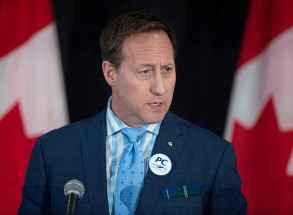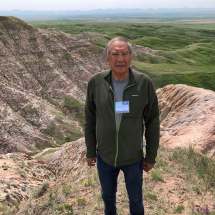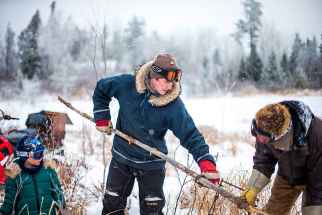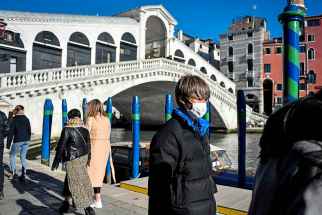Changing climate, threatened cultures Beyond science-based predictions of misery and mayhem as Earth heats up, there are centuries-old, sacred human connections to the planet hanging in the balance
Read this article for free:
or
Already have an account? Log in here »
To continue reading, please subscribe:
Monthly Digital Subscription
$1 per week for 24 weeks*
- Enjoy unlimited reading on winnipegfreepress.com
- Read the E-Edition, our digital replica newspaper
- Access News Break, our award-winning app
- Play interactive puzzles
*Billed as $4.00 plus GST every four weeks. After 24 weeks, price increases to the regular rate of $19.95 plus GST every four weeks. Offer available to new and qualified returning subscribers only. Cancel any time.
Monthly Digital Subscription
$4.99/week*
- Enjoy unlimited reading on winnipegfreepress.com
- Read the E-Edition, our digital replica newspaper
- Access News Break, our award-winning app
- Play interactive puzzles
*Billed as $19.95 plus GST every four weeks. Cancel any time.
To continue reading, please subscribe:
Add Free Press access to your Brandon Sun subscription for only an additional
$1 for the first 4 weeks*
*Your next subscription payment will increase by $1.00 and you will be charged $16.99 plus GST for four weeks. After four weeks, your payment will increase to $23.99 plus GST every four weeks.
Read unlimited articles for free today:
or
Already have an account? Log in here »
Hey there, time traveller!
This article was published 28/02/2020 (2164 days ago), so information in it may no longer be current.
Leroy Little Bear grew up observing the land and its creatures on Canada’s largest Indigenous reserve, the Blood Tribe, in southwestern Alberta. He remembers as a child watching the geese migrate south and the deer fleeing to the mountains for shelter as the winter cold approached.
“But now the geese stay out the year long,” Little Bear says. “And the deer stay out on the plains.”
Little Bear, now in his 70s, is an Order of Canada recipient and a professor emeritus at the University of Lethbridge. He says Indigenous communities have known about climate change for at least five or six decades, and that was knowledge that came from the direct observations of — and connection with — the land.
“The western way of thinking about science is all about measurement,” he says. “And anything you cannot measure is not ‘science.’ For native people, it’s not so much about measurement. It really is about relationships and relational networks.”
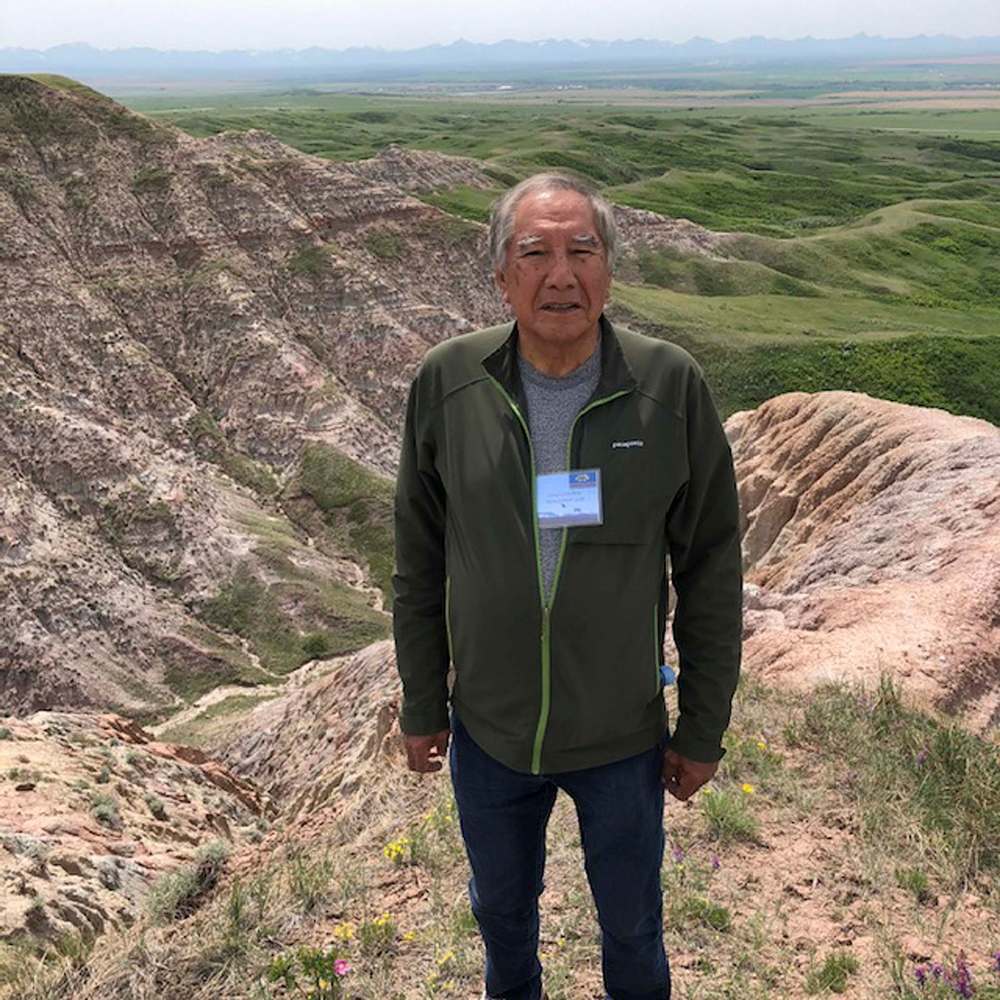
The complexities of how the world is changing can’t be described by the number of degrees it warms, he says, it also has to be about understanding how that warming disrupts the entire ecosystem.
Coming at this issue from a western science perspective, Scott Higgins agrees that climate-change implications are much more complex than many understand. Higgins is a research scientist at the International Institute for Sustainable Development, a Winnipeg-based think tank.
“If you only knew the annual average change in air temperature, you’d miss a lot,” Higgins says.
But as Little Bear points out, climate change isn’t a future problem; its impacts have been felt for decades. The magnitude of those repercussions will only continue to grow with time, unless global carbon emissions are slowed, and then virtually stopped.
In 2018, the Intergovernmental Panel on Climate Change drew a proverbial line in the sand and told world leaders that changes needed to be made in the next 12 years if there is any hope of keeping warming to 1.5 C.
Warming beyond that is incompatible with human civilization as we know it. The risk of conflict, famine, disease and natural disasters all rise significantly even if there is only another half-degree of warming that takes place, according to the same IPCC report.
Rising sea levels might be what most people think of when they think of climate change but that doesn’t mean this region is immune to other effects. Here in Manitoba, climate change is triggering greater spring rains and warmer temperatures in both winter and summer, for starters.
“The western way of thinking about science is all about measurement and anything you cannot measure is not ‘science.’ For native people, it’s not so much about measurement. It really is about relationships and relational networks.” – Little Bear
More rain in the spring doesn’t just mean you need a better umbrella, it affects waterways, the kind of crops that can thrive in our landscape, even how we build our cities’ infrastructure. The spillover effects are endless and complex.
Higgins conducts his research at the freshwater research facility known as the Experimental Lakes Area in northwestern Ontario. The facility is meant to conduct whole-ecosystem experiments, but more than 50 years ago, researchers started tracking air and water temperatures (among other things) as part of their control data and, inadvertently, they started tracking local climate change.
The ELA data independently demonstrates that this region — like much of Canada and other northern countries — is witnessing warming that far outpaces the global average. This has been corroborated by federal research numbers that say the Prairies have already warmed by 1.9 C between 1946 and 2016, compared with the global average of 0.8 C.
“(It’s) a lot faster than the global average, but it is pretty standard for the latitude that we’re at,” Higgins says. “I get a number of people who tell me, ‘Just so you know, I don’t believe in climate change.’ So I say, ‘Well, let’s just look at the data.’”
Higgins says for many people, having that chance to see the raw data for themselves, gathered in their own backyard, changes their perspective.
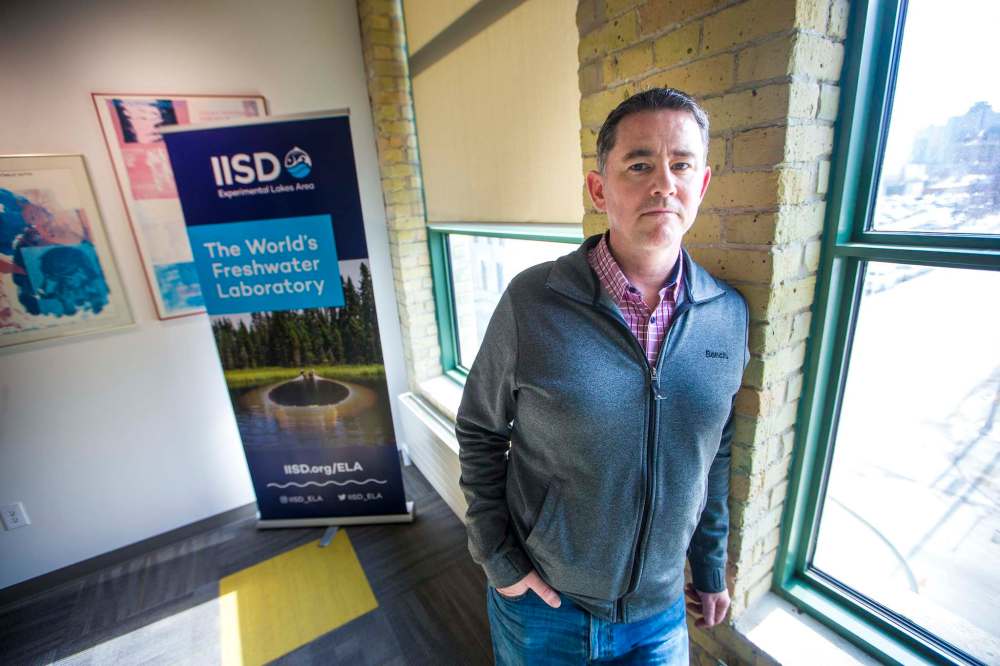
Internationally recognized climate modelling allows us to take a look past what is already happening towards what the future holds. For example, in a hypothetical future world — one where we’ve collectively acted to lower emissions, starting now — there will still be nearly two degrees of warming (1.7 C), on average, globally by 2050. But here in the Prairies, that’s expected to be higher, at roughly 2.8 C. Expand the timeline to the end of the century, and that difference has expanded to 2.2 C and 4.3 C, respectively.
And that’s the optimistic version of events. This assumes that annual carbon emissions start declining, which is the exact opposite of what’s happening.
In 2018, carbon emissions increased by 2.8 per cent over 2017; the fastest rate of increase seen in years. Though the totals aren’t in yet, emissions from 2019 are expected to have climbed again, according to estimates from the international research consortium, the Global Carbon Project.
Realistically, the ambitious goal of restraining warming to 1.5 C, originally set by the IPCC in 2018 has become unattainable. Emissions would have to drop by roughly 15 per cent per year in order to achieve that goal. So now we aim for the global two-degree scenario (what ends up being more than four degrees for Winnipeggers). Let’s hope that target doesn’t also pass us by, but it can’t be taken for granted that it won’t.
In a less-optimistic climate forecasting model, wherein humans continue to emit carbon at status quo levels, things quickly become dire for this region, and for the rest of the world. In this scenario, globally, temperatures will rise by 4.0 C by the end of the century. In the Canadian Prairies, it will be more like 6.6 C.
“What that means is, winters as we know it, are gone,” says Danny Blair, a University of Winnipeg climatologist and the Director of Science for the Prairie Climate Centre.
“Winter is a really important part of our climate, a really important part of our ecosystem, of our culture, an important part of our hydrology — for both Indigenous and non-Indigenous (communities).”
How much snow falls is changing, and when lakes freeze and thaw is shifting. That means less time during the winter that ice roads will be reliable, which will have a significant impact on the more remote parts of the province.
Take Churchill, for example. On average from 1976 to 2005, the town had 50 days each year that temperatures dropped below -30 C. In the 2050-80 period, the average is projected to shrink to eight days.
Blair says, until now, most of the warming has happened in the winter but soon more significant changes will occur at other times of the year, as well.
“Winter is a really important part of our climate, a really important part of our ecosystem, of our culture, an important part of our hydrology– for both Indigenous and non-Indigenous (communities).” – Danny Blair, Director of Science for the Prairie Climate Centre.
In this scenario in Winnipeg, spring rain is expected to increase by 17 per cent, but decrease by three per cent in the summer. More than an entire month of days at or above 30 C would be added to the calendar.
Blair admits that many people’s first response to that news is that a warmer climate might not be such a bad thing, but that perspective likely fails to consider the consequences.
To start, heat waves kill people. Two people died in southern Manitoba last summer, and 66 died in a single heat wave in Montreal in 2018. Higher temperatures mean more forest fires, creating more smoke blowing across the country.
It’s also an economic problem. Winnipeg city council will soon be mulling a $2.6-million funding request for the purposes of implementing a climate action plan.
Economists are still debating how much this will cost when all factors are tallied, but the most pessimistic estimates are grim, indeed. A recent working paper by the International Monetary Fund cited one study that pegged the hit to global GDP to be 23 per cent by 2100. That study made it clear that the economic pain would not be divvied up equally, estimating that per capita GDP in South and Southeast Asia, as well as Sub-Saharan Africa would fall by as much as 80 per cent.
More than money lost, international leaders of developing nations are trying to hold developed countries, such as Canada, accountable for their role in allowing climate change to threaten some of the most vulnerable regions of the world.
The climate ambassador for the Marshall Islands, Tony de Brum, has called even a two-degree scenario (that’s the optimistic one) the equivalent of genocide.
“Displacements of populations and destruction of cultural language and tradition is equivalent, in our minds, to genocide,” de Brum told Radio New Zealand in 2015.
But we need not look to faraway countries; climate change is destroying key aspects of culture right here in Canada.
Little Bear recalls how one of the ceremonies important to his people is meant to happen after the first thunder of the spring. As rains come earlier and earlier, the ceremony and all of the other relationships that were once held between the first thunder and the ecosystem are now broken.
“Imagine if you are a Christian and all of the crosses from your town were removed. And maybe we go further and say all of the little churches on street corners were removed,” he says. “What kind of impact would that have on you?
“You would still have all of your beliefs, but there’s just something missing. Right? Well that is similar (to this). How the climate is changing is affecting certain patterns that the culture is based on.”
sarah.lawrynuik@freepress.mb.ca


